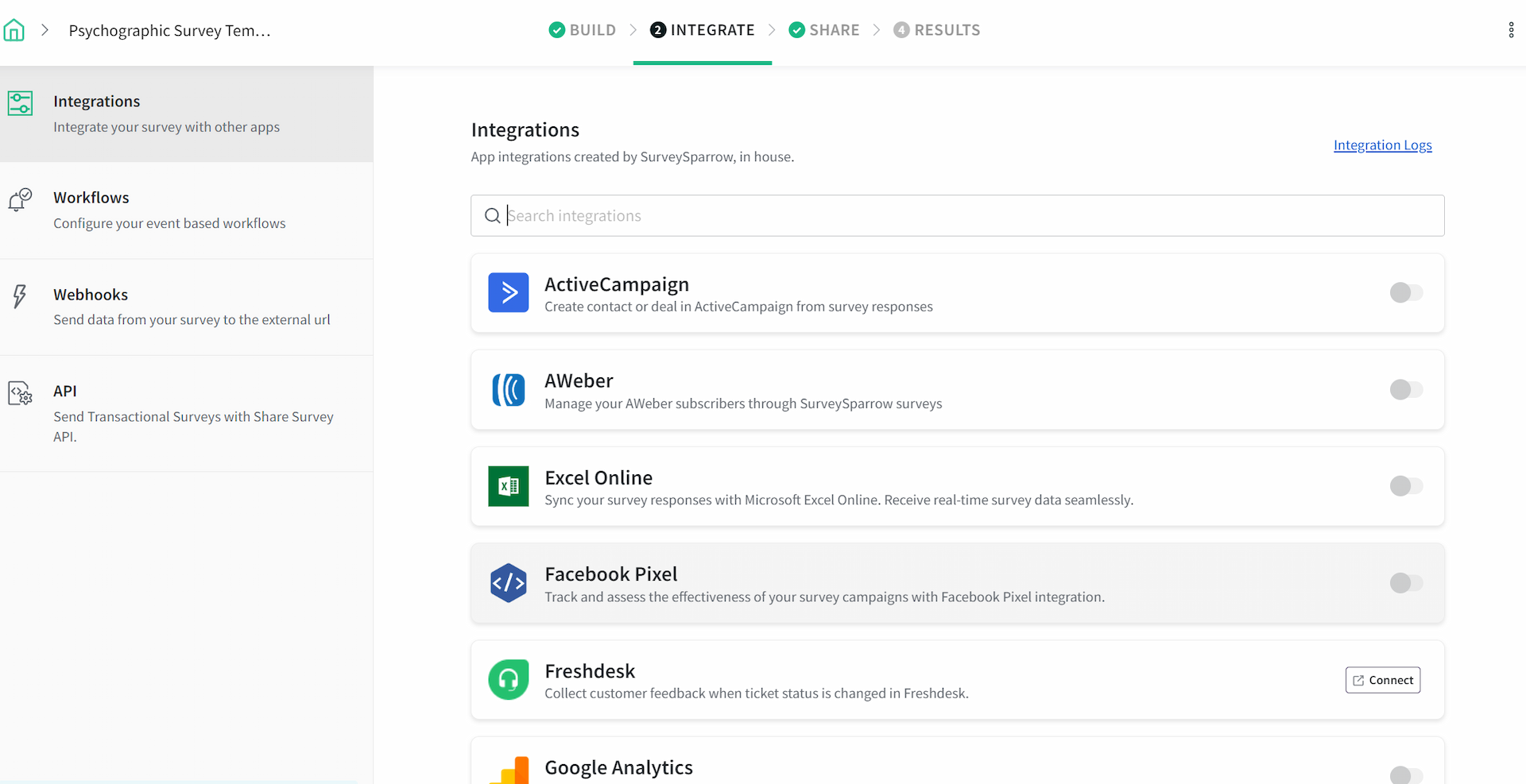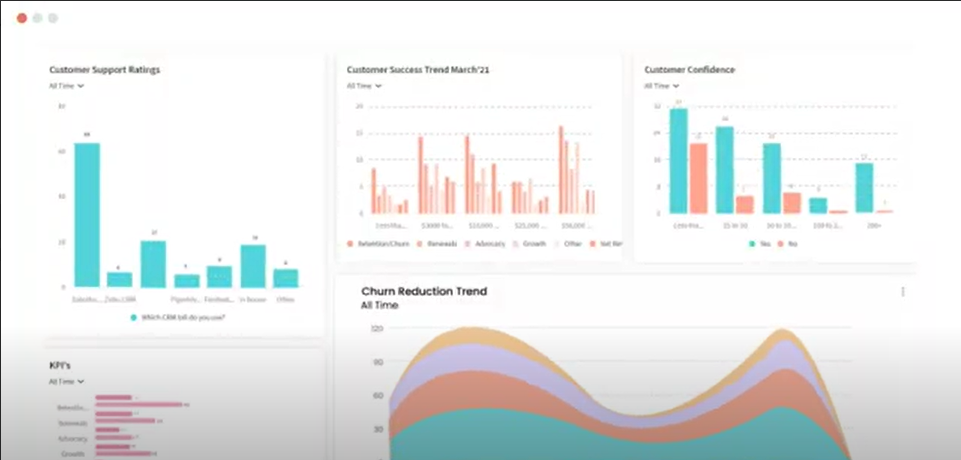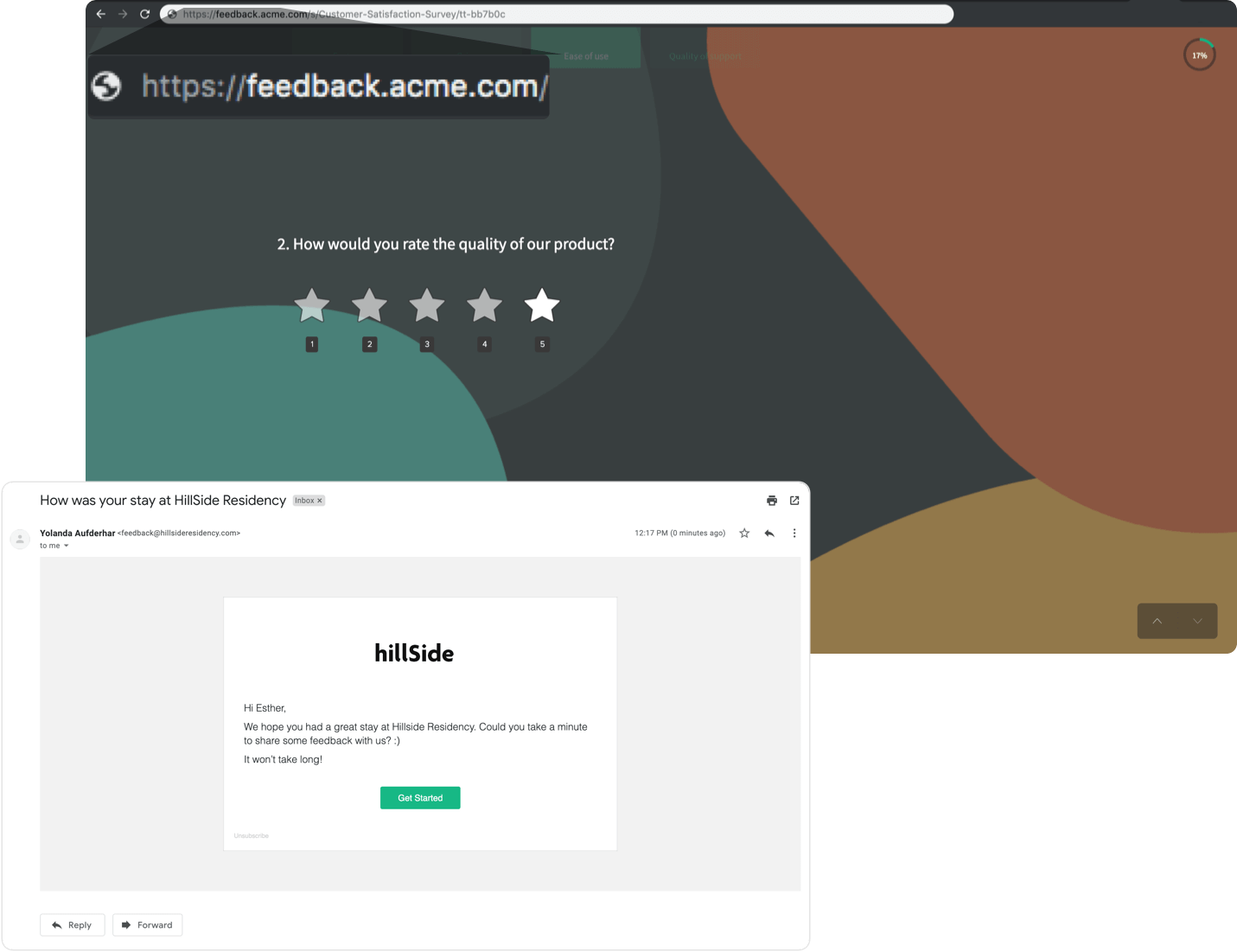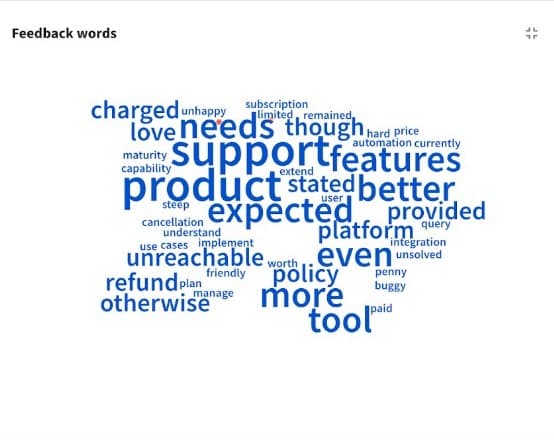Psychographic Survey Template
Why use this psychographics survey template?
Enable sentiment analysis for open-ended questions to understand the emotional state of respondents. Get a word cloud in the report and get actionable insights.
Collect comprehensive information with 20+ question types in the builder, like multiple choice, opinion scale, rating scale, rank-based, heat map, etc.
Display your logo on the welcome screen, use a collection of pre-designed themes, Unsplash image gallery color, and font choices in the builder to match the survey with your brand.
Research shows that psychographic surveys work up to four times better than demographic-based approaches.
Your customer demographics might be clear, but their buying motivations could remain a mystery. Psychographic survey questions reveal the core values, beliefs, and motivations behind customer purchases. The process goes beyond basic age and location data to reveal what truly drives your audience.
A psychographic survey questionnaire enables you to build detailed customer profiles that enhance your marketing copy and customer experience. Your messaging becomes more targeted as you connect with your customers' primary concerns.
Let us help you build psychographic questions that elicit honest answers. SurveySparrow's free psychographic survey template will get you started immediately.
What is a Psychographic Survey?
A psychographic survey gathers information about people's psychological traits and focuses on the "why" behind customer choices. These surveys delve into attitudes, values, interests, and lifestyle priorities that shape buying decisions, unlike standard questionnaires.
Psychographic survey questions explore your customers' deeper motivations. Demographic surveys reveal who your customers are through age, location, or income, while psychographic surveys show how they think and what drives their purchases. Research shows that using psychographic information to target customers proved four times more effective than demographic information.
The term "psychographics" blends "psychology" and "demographics," commonly known as AIO: Activities, Interests, and Opinions. These surveys capture qualitative data that helps build detailed customer profiles, though analyzing this information can be challenging.
Key elements measured in psychographic surveys include:
- Lifestyle patterns - daily routines and social habits
- Values and core beliefs - what matters most to customers
- Interests and hobbies - how people spend their free time
- Opinions and attitudes - views on products, services, and issues
- Personality traits - whether someone is introverted or extroverted
SurveySparrow's psychographic survey template helps you craft questions that uncover these deeper psychological characteristics. These insights help customize your marketing messages to connect with customers personally.
The best approach combines open-ended questions like "Why did you choose our product?" with multiple-choice options. This mix lets customers express themselves freely while keeping data structured for analysis.
Psychographic surveys become more powerful when combined with demographic data. This combination creates a complete picture of your customers' identity and motivations. Such deep understanding helps create marketing campaigns that strike a chord with your target audience.
What Information Should a Psychographic Survey Contain?
Psychographic surveys need to capture six key areas to understand customers better. Your questions should target specific psychological attributes that drive buying decisions.
A detailed psychographic survey needs questions covering these significant areas:
- Values and beliefs - Ask about principles that guide decisions, environmental concerns, or social issues they care about
- Interests and hobbies - Explore free time activities, content priorities, and topics they want to learn more about
- Lifestyle habits - Uncover daily routines, work-life balance, and social activities
- Attitudes and opinions - Gather thoughts on technology, brands, and customer service experiences
- Personality traits - Determine if they're introverted or extroverted, how they handle stress, and what motivates them
- Brand perceptions - Learn which brands match their values and what factors build their loyalty
Your psychographic survey questions should blend both open-ended and structured formats. Open-ended questions like "What is your main goal for using our product?" let people express themselves naturally. Multiple-choice or ranking questions make data organization and analysis easier.
The best approach starts with a simple prompt like "How would you describe yourself in one sentence?" This helps collect simple demographic information before exploring deeper motivations.
Questions such as "What is preventing you from achieving your goals?" or "What changed after you started using our product?" reveal the barriers and benefits that shape customer decisions.
SurveySparrow's psychographic survey template offers proven questions in all six categories. Your survey should stay focused with no more than 15 questions to avoid respondent fatigue.
Note that psychographic data works best alongside demographic information. These two elements create a complete picture of your customers' identity and motivations, providing practical information to target marketing and product development effectively.
How to Plan and Track a Psychographic Survey
A successful psychographic survey needs proper planning and execution. Here are some practical steps that will help you learn about your customers' mindsets.
Define clear objectives first
Your psychographic survey should start with specific goals. The SMART framework (Specific, Measurable, Achievable, Relevant, Time-bound) helps focus your research. You might want to identify the top three values that drive your target audience's purchasing decisions within the next six months.
Choose the right collection method
The survey methods should match your objectives and audience:
- Online surveys help reach wide audiences quickly
- Focus groups are a great way to get deeper interactive insights
- Social media analysis shows natural behavior patterns
- Customer interviews capture unscripted, genuine feedback
A concise survey works best—people tend to complete surveys that take less than five minutes. SurveySparrow's template simplifies this process with ready-to-use psychographic questions.
Craft effective questions
Questions should start broad, like "What's your biggest challenge when finding products for your lifestyle?". More specific questions can include:
- Open-ended questions to get detailed insights
- Multiple-choice options to make analysis easier
- Likert scales to measure satisfaction levels
- Ranking questions to establish priorities
Analyze and apply your findings
The patterns in your data tell important stories. Similar answers should be grouped together and categorized with keywords to simplify analysis. These analytical insights help you:
- Create detailed customer segments based on shared traits
- Shape marketing messages for specific audience motivations
- Adjust product features to line up with customer values
- Design experiences that match your audience's lifestyle priorities
Offering incentives like discount codes or exclusive content boosts participation rates. This improves both the quantity and quality of responses you receive.
Regular tracking of results and follow-up surveys shows how customer attitudes change over time. This ongoing process will give a current and useful understanding of your audience.
Grab the Ready-to-Use Psychographics Survey
Need customer insights right now? You can skip building a psychographic survey from scratch. SurveySparrow's free template is ready to use.
This psychographic survey template has expert questions that reveal your customers' motivations, values, and priorities. You'll get professional results without spending hours on research and planning.
The template has:
- Question formats that get honest answers
- A natural flow that keeps people interested
- Sections you can adapt to your business
- A design that works well on phones
- Tools that organize your data automatically
You can start in minutes. Just go to SurveySparrow's template library and click "Use This Template." Then customize the questions, add your brand elements, and share it through email, social media, or your website.
SurveySparrow's dashboard helps you understand patterns as responses come in. The platform creates visual reports that show trends in different customer groups clearly.
The template works great as a foundation for deeper psychographic research. You can add questions about your specific products to get more targeted feedback from customers.
Companies typically see a 40% higher response rate with these professional templates compared to surveys built from scratch.
Stop guessing what customers want. Learn the reasons behind their choices. SurveySparrow's psychographic survey template helps turn casual shoppers into loyal customers who feel understood.
Get your free template now and find what drives your audience.
Other Useful Survey Templates:
See All

Speaker Evaluation Form Template

Sales Candidate Assessment Form Template

Shopper Insights Survey Template
More Features of Psychographic Survey Template
This psychographic survey template comes with a set of features that takes the functionality of the template beyond only a tool for data collection. After conducting a survey by asking psychographic survey questions, you can analyze data and segment customers using SurveySparrow. This will help you make clear strategic marketing decisions.
Bunch of Integrations

Executive Dashboard

White Labeling

Sentimental Analysis


